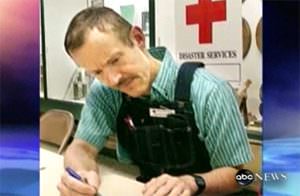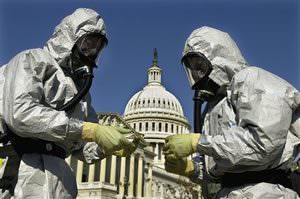Scientist Targeted in Anthrax Probe Dies in Apparent Suicide
The apparent suicide of 62-year-old scientist Bruce E. Ivins on Tuesday shook up his co-workers at the military biodefense labs in Maryland where he'd worked for nearly two decades. But the significance of his death extended beyond personal tragedy when it emerged that Ivins was about to be prosecuted by the Justice Department for alleged involvement in the anthrax attacks of 2001.
The apparent suicide of 62-year-old scientist Bruce E. Ivins on Tuesday shook up his co-workers at the military biodefense labs in Maryland where he’d worked for nearly two decades. But the significance of his death extended beyond personal tragedy when it emerged that Ivins was about to be prosecuted by the Justice Department for alleged involvement in the anthrax attacks of 2001.
Your support matters…Los Angeles Times:
Ivins, whose name had not been disclosed publicly as a suspect in the case, played a central role in research to improve anthrax vaccines by preparing anthrax formulations used in experiments on animals.
Regarded as a skilled microbiologist, Ivins also helped the FBI analyze the powdery material recovered from one of the anthrax-tainted envelopes sent to a U.S. senator’s office in Washington.
Ivins died Tuesday at Frederick Memorial Hospital after ingesting a massive dose of prescription Tylenol mixed with codeine, said a friend and colleague, who declined to be identified out of concern that he would be harassed by the FBI.
The death — without any mention of suicide — was announced to Ivins’ colleagues at the U.S. Army Medical Research Institute of Infectious Diseases, or USAMRIID, through a staffwide e-mail.
“People here are pretty shook up about it,” said Caree Vander Linden, a spokeswoman for USAMRIID, who said she was not at liberty to discuss details surrounding the death.
The anthrax mailings killed five people, crippled national mail service, shut down a Senate office building and spread fear of further terrorism after the Sept. 11 attacks.
Independent journalism is under threat and overshadowed by heavily funded mainstream media.
You can help level the playing field. Become a member.
Your tax-deductible contribution keeps us digging beneath the headlines to give you thought-provoking, investigative reporting and analysis that unearths what's really happening- without compromise.
Give today to support our courageous, independent journalists.


You need to be a supporter to comment.
There are currently no responses to this article.
Be the first to respond.